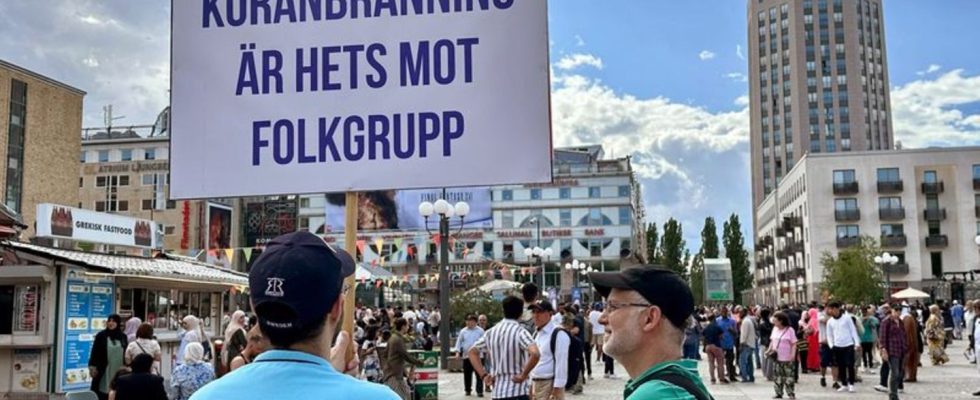religion
Sharp criticism of the Koran action in Stockholm
A man holds up a sign reading ‘Koranbränning är hets mot folkgrupp’ (Koran burning is incitement against population groups) in Stockholm. The burning of a Koran near the mosque recently sparked anger and criticism of Sweden from Muslims around the world. photo
© Steffen Trumpf/dpa
In Stockholm, another Koran was denigrated in an Islamophobic action. Sharp criticism comes from the Middle East. In Sweden, investigations into possible hate speech are under way again.
Muslim-dominant countries have the renewed denigration of a Koran in the Swedish capital Stockholm sharply criticized. The Saudi Foreign Ministry said on Friday that it was a “systematic provocation against the feelings of millions of Muslims around the world”. The “irresponsible actions of the Swedish authorities” have allowed extremists to desecrate the Holy Koran.
Thousands of demonstrators took to the streets in Iran. Believers took part in the state-organized and nationwide protests after Friday prayers, state radio reported. The Swedish ambassador was summoned to the Foreign Ministry in the capital, Tehran, on Thursday evening in a sharp form of diplomatic protest. Saudi Arabia and Qatar also called in their respective Swedish ambassadors.
Protests in Lebanon and Iraq
The pro-Iranian Hezbollah in Lebanon called for demonstrations on Friday. Thousands of Hezbollah supporters joined the nationwide protests. Meanwhile, the Lebanese army protected the entrance to the Swedish embassy in Beirut. There were also nationwide protests in Iraq on Friday.
Criticism also came from Turkey. The Foreign Ministry wrote on Thursday evening that Sweden was expected “to take deterrent measures in line with its international responsibility to prevent this hate crime against the religion of Islam and its billions of believers”. Pakistani Prime Minister Shehbaz Sharif spoke on Twitter on Friday of a “sinister, vile and despicable agenda”. In an official statement, the politician also called on Sweden to take action against acts of this kind.
The Swedish police had authorized a meeting in Stockholm at which the applicant again wanted to burn a Koran. In the end, the Holy Scriptures of Islam were not burned during the action on Thursday afternoon: the man trampled on a copy of the book and tried to light it with a comrade-in-arms. However, the fire did not ignite properly. According to pictures, some pages of the book showed small burn marks.
Investigations in Stockholm
The Swedish authorities are now investigating the case because of possible incitement to hatred. A corresponding advertisement had been created and a preliminary investigation led by a public prosecutor had been started, the Stockholm police said at the request of the German Press Agency. Since the burning of the Koran on June 28, investigations have been underway against the person responsible for the campaign, a native of Iraq, for possible incitement to hatred, among other things.
The renewed action had already strained relations between Iraq and Sweden in advance. The Swedish embassy in Baghdad was stormed by angry demonstrators on Thursday night. Sweden lodged an official protest, demanding better protection for its diplomats from the Iraqi authorities. Instead, Iraqi Prime Minister Mohammed Shia al-Sudani had the Swedish ambassador expelled. Baghdad even threatened to sever diplomatic relations altogether. Sweden temporarily relocated embassy operations from Baghdad to Stockholm, as the Foreign Ministry announced when asked by dpa.
Meanwhile, an arrest warrant has been issued in Turkey against another man who repeatedly provoked the burning of the Koran. According to Turkey’s Justice Minister Yilmaz Tunc, investigations have been launched against Danish-born Rasmus Paludan and nine other people, including the man responsible for the recent incidents in Stockholm. The reason given was incitement of the people. The right-wing extremist and provocateur Paludan set fire to a Koran in front of the Turkish embassy in Stockholm in January.

